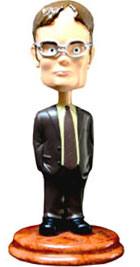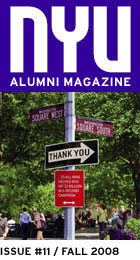King of the Watercooler
Rainn Wilson chats about the art of playing the oddball
by Renee Alfuso/CAS ’06
Rainn Wilson (TSOA ’89) has more in common with his alter ego Dwight Schrute, of NBC’s The Office, than one might expect. “I was very much like Dwight in my teenage years,” he admits. “I played a lot of Dungeons & Dragons.” Today both share a taste for classic metal music, as well as TV shows such as Lost and Battlestar Galactica. And while Dwight has a purple belt in karate from his local dojo, Wilson is penning a screenplay about an alcoholic ninja living in the San Fernando Valley titled Bonzai Shadowhands. But luckily for the entertainment world, Wilson isn’t devoting his life to paper—he just sells it on TV.
Now in its fifth season, The Office is no typical sitcom: It employs a faux-documentary style to follow the workaday drudgery at Dunder Mifflin, a failing paper company in Scranton, Pennsylvania. The show is a hit, thanks to its deadpan wit—carried over from the British series on which it’s based—and multidimensional, off-the-wall characters such as Dwight, who in his spare time runs a beet farm, enjoys laser tag, and is a former Lackawanna County volunteer sheriff’s deputy. For the past two years, the sizable cast has won the Screen Actors Guild Award for Outstanding Performance by an Ensemble in a Comedy Series, and Wilson’s portrayal of the dorky assistant (to the) regional manager has stood out as a viewer favorite. The Dwight bobblehead doll is now the best-selling item in the history of the NBC Universal Store and Wilson even scored a spot on People magazine’s Sexiest Man Alive list as one of the hottest geeks on TV.
But the Seattle-born funnyman wasn’t always so popular. Wilson spent 10 years in New York doing theater—“always at a poverty level”—and was rejected, he says, by just about every agent in town. Surprisingly, his struggles came to an end after he moved to Los Angeles, where he discovered that most comic actors were standup and sketch comedians so there was a niche for trained actors in offbeat supporting roles in television and film. Wilson’s breakout part came when he was cast as the mortuary intern Arthur Martin on HBO’s Six Feet Under. “I really hold that character very close to my heart,” he admits, since it brought him to the attention of producers on The Office.
With prime-time stardom and a cult-like following, Wilson is now jumping to the big screen. After a memorable turn as Rollo, the convenience store clerk in 2007’s Oscar-winning indie film Juno, he landed his first lead role in this summer’s comedy The Rocker. Swapping his suit and tie for tight pants and a Def Leppard–style haircut, Wilson cracked up audiences as Robert “Fish” Fishman, a former heavy-metal drummer who gets a second shot at fame—by joining his nephew’s high school rock band. Next up will be DreamWorks’ Monsters vs. Aliens, the first computer-animated feature to be shot originally in 3-D, followed by an appearance in the action-infused sequel Transformers: Revenge of the Fallen. “I like being able to do the full spectrum of movies, from tiny independents to huge summer shoot-’em-up blockbusters,” he says. But loyal Dwight fans shouldn’t worry—Wilson will be back at his Dunder Mifflin desk each Thursday night.
Why do you think your career took off after you moved to L.A.?
I had really shifted my attitude at that point in time. I stopped trying to please people and had much more of a “fuck it” attitude—you know, “Fuck ’em if they can’t see how brilliant I am.” So I stopped trying to dress how I thought they wanted me to and I started just wearing my normal thrift-store clothes and just being my normal, quirky self. I stopped trying to be anything different than who I was and I just kept getting more and more work.
As an actor, instead of a paintbrush, your medium is yourself, so the more you work with yourself and the more trust you have in yourself, the further you’ll go. But sometimes with actors, the last thing they work on is themselves. There’s never been a bunch of more needy, approval-seeking, insecure weirdos than actors.
What influenced your quirkiness?
Growing up, my dad showed me a lot of his favorite kind of comedy, and I remember by the time I was like 7 or 8 years old, I had seen every Marx Brothers movie and could quote them. They showed me what was possible with comedy and really opened my mind to the artistry and insanity of comedy, and the joy of it.
Speaking of mixing art and insanity, you and Philip Seymour Hoffman both graduated from Tisch School of the Arts at the same time, and then years later you’re wrestling each other at the Film Independent’s Spirit Awards. Is this just a coincidence or an ongoing joke from college?
Yeah, you know we wrestled each other in our first year at NYU, but he beat me and I vowed revenge. And I will exact my revenge. There Will Be Blood—there will be Philip Seymour Hoffman blood.
What’s your craziest memory from NYU?
I have a lot of crazy memories, but a lot of them involve illegal substances and activities. After I graduated I was living in an abandoned brewery out in Williamsburg, Brooklyn, and I used to bring a towel in my backpack and go to Tisch because there was actually a shower in the basement bathroom, and that’s where I used to take my showers.
Did you ever imagine then that one day you’d make it big as a comic actor?
Well, I didn’t go into this wanting to do comedy. My whole training process was based in classical plays and theater exercises, and I always found that I was better and more natural when doing comedy. But when The Office is done, I’m very much looking forward to coming back to New York and doing some theater and going back to my roots.
How does your theater background help as opposed to someone who goes straight into comedy?
I think that an actor who does comedy understands how to make strong choices and how to commit to those choices completely. A lot of times people who do stand-up and sketch comedy, it’s all about getting the laugh first and character is second or third or fourth. But you have to inhabit the character completely and commit to what [he] wants in order to bring it to life. That’s just how I roll.
Well, Dwight is certainly a character that you’ve brought to life.
On any other show he would have just been the office nerd, the lame guy, and only had one or two colors to his entire personality. But on The Office, you learn so much about him—you learn about his love life, his family and friendships, his background. So someone that can be so annoying and dorky sometimes can also be really passionate and romantic and noble as well. People feel like they know Dwight, so he really is a three- dimensional character, even as absurd as he is.
Do you think the two of you would be friends if you met in real life?
Absolutely. We’re both so incredibly sexy that we’d have to hang out with each other. Like Matt Damon and Ben Affleck.
You’re both big fans of the show Lost, so would you rather sell paper for a living or be stranded on a desert island?
I think the best of all possible worlds would be selling paper on a desert island. If Dwight could land on the island of Lost with lots of paper and sell it to The Others, that would be so cool! I’m sure he would just curl up and die in happiness.
Working with such a funny cast on The Office, is it ever hard to keep a straight face on set?
It’s very, very hard and I break character all the time. Sometimes you just have to take breaks because we’re laughing so much. Ed Helms’ acting always makes me laugh, in person not so much, but when he plays Andy it always cracks me up. And I can always make Brian Baumgartner [who plays Kevin] laugh. I can just kind of look at him and he will just start to laugh. I can do it at will; it’s just a power that I have.
Do you do a lot of improv on the show?
The great thing about The Office is that you can do as many takes as you want and they’ll decide in the editing room, so we’re always given free rein to do whatever the hell we want. It’s very liberating because you don’t feel like you have to go in and nail lines or jokes. But the scripts are so good that you don’t really need to improv. A lot of times there’ll be a little three-quarters-page scene and it’s just perfectly written.
Now that you’ve conquered television, what’s your dream acting role?
I would like to play myself in the bio pic. But I think they would cast Philip Seymour Hoffman to play me in The Rainn Wilson Story. He’d be terrific. I think he’d actually be better at me than I would. He’d be listening to my voice tapes over and over again and committing them to memory.
Would that be a more challenging role for him than Truman Capote?
Oh, a much greater challenge. I’m a far more complex and deep individual than that little pip-squeak.
What advice do you have for people who are reading this while stuck in a real office?
Just quit. Walk away—just start walking to Los Angeles and try to get on a TV show. It’s so easy, they’re just giving it out like candy!
Photo © Brent Humphreys/Redux

Dwight Schrute’s Words of Wisdom:
“I keep various weaponry strategically placed around the office. People say ‘oh, it’s dangerous to keep weapons in the home or workplace.’ Well I say, it’s better to be hurt by someone you know accidentally than by a stranger on purpose.”
“I never smile if I can help it. Showing one’s teeth is a submission signal in primates. When someone smiles at me, all I see is a chimpanzee begging for its life.”
“I don’t have a lot of experience with vampires, but I have hunted werewolves. I shot one once, but by the time I got to it, it had turned back into my neighbor’s dog.”







